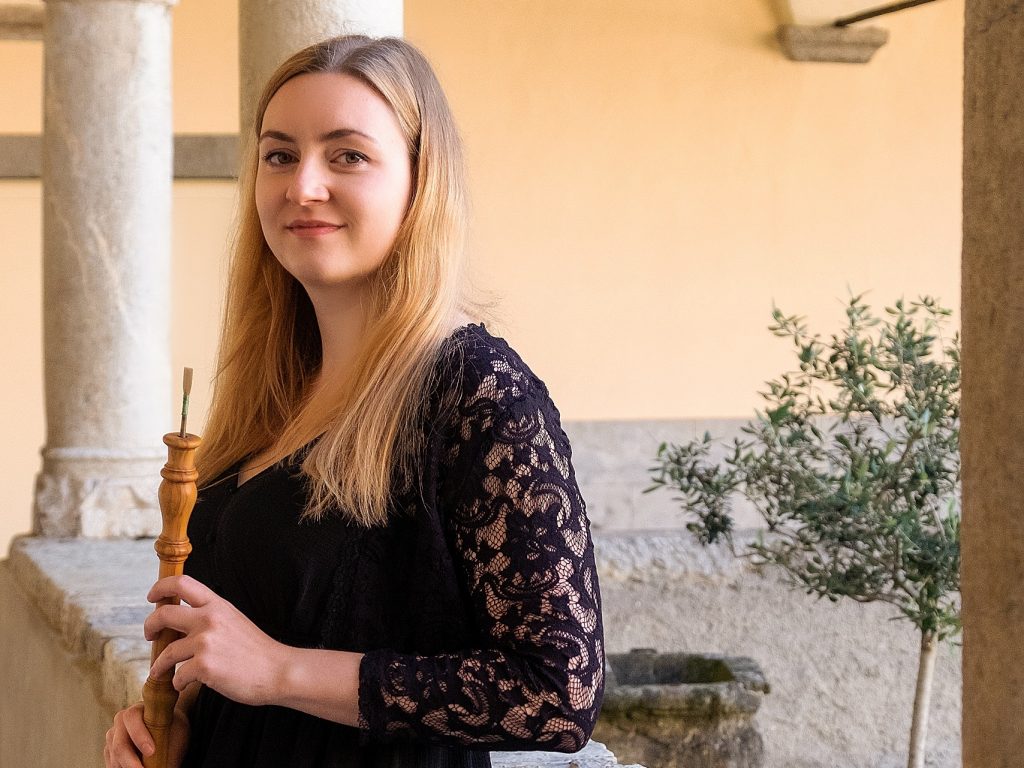
Austrian oboist Laura Hoeven joined Theresia in 2021 and she is currently playing with Theresia Wind Ensemble: let’s find out more about her upbringing, her love of music, and the three most important things she learnt while playing in our orchestra!
Laura, tell us about your musical upbringing: how did you start playing the oboe? And when did you turn to the period instrument?
As a child, I started playing the recorder. When my parents listened to classical music at home, I really loved the sound of oboes, so I was interested in taking up oboe lessons. Unfortunately, there was no oboe teacher at my music school. One day when I was in high school, my recorder teacher told me that I could have a recorder lesson at the Music and Arts University of Vienna to see if I would be interested in studying music. Surprisingly, it turned out that the university teacher taught historical oboe instruments too. I got the chance to try out the baroque oboe and I managed to produce some sound – of course not super beautiful, but at least some notes came out of the instrument. I definitely knew that I want to learn the baroque oboe. I took historical oboe lessons and started a pre-study at the university. Later, I also started playing the Viennese oboe because I was very interested in the development of the oboe in the course of history. So, I actually started playing the period instrument first. Now, I’m about to finish my Master in ‘historical oboe instruments’.
What were the most important experiences that made you realise that music was where you wanted to go?
My parents always enjoyed listening to music and they both played musical instruments (piano and saxophone). I guess this is also why I discovered my love for music. When I was five years old, a friend of mine took music lessons, which inspired me to learn an instrument too. I think it actually happened step by step that I realised that music is where I wanted to go. I can recall the moment I got the chance to play the baroque oboe in an orchestra for the first time. After that, I could picture myself doing this professionally and studying music because I really enjoyed it.
Your first project with Theresia was with Alfredo Bernardini in Lodi in the autumn of 2021: what do you recollect of that experience?
I remember it as a very fun project. It was my first one and I didn’t really know what to expect, but I learned a lot during that residency. First of all, it’s fantastic to work with Alfredo Bernardini because he knows how to get the best out of everyone through his energy, his ideas and imaginative pictures of passages in the music. I also enjoyed that we experimented with the distribution of the instruments in the orchestra. In the rehearsal, we ended up playing the pieces next to instruments from other sections as an exercise. Suddenly, we could hear voices that we haven’t noticed before and it was easier to become aware of similar passages that we share with other instruments. The sound of the orchestra changed completely after that experiment because everyone was very attentive and reacting to everything that was happening. As a group, you really grow together after such an orchestral project.
You are involved in a chamber music project with Theresia Winds instruments, but you have joined orchestral residencies as well: in terms of rehearsal and performance experience, how much does playing in an ensemble differ from playing in an orchestra?
Yes, there is a difference between playing wind ensemble or orchestral music. The music that is composed for wind instruments demands something different from every musician than orchestral music. During the rehearsals with the Theresia Winds, we grow together as a group because there is no conductor. Sometimes, you need to lead the group with your instrument, or you have to react. This changes constantly, and you are required to be very flexible, which is fun and challenging at the same time. In orchestral music the function of the wind instruments is different. They have to blend with the strings, be a harmonic framework or play melodic passages. So, it’s good to be aware of that. Both ways of playing are enjoyable and demanding and there is a lot to learn for the professional life as a musician.
After two years, which in your opinion are the three most important things that Theresia has taught you?
1. No matter where you come from – music is a universal language. Even though we all come from various countries, it is really easy to connect through music.
2. Try to take a risk and use this opportunity to learn and to try out.
3. Most importantly, enjoy the time that you get to make music together!
They say that playing in a youth orchestra lets you meet people who will be your friends for life: do you think this happened to you in Theresia?
Yes, I definitely think so!
Which are your plans for your musical future?
I would like to continue playing in orchestras and ensembles. Also, it would be great to start my own chamber music ensemble. Basically, I would love to get the chance to do various projects.
What do you do when you do not play? Do you have any other passions that do not involve music?
When I’m not playing an instrument, I like to go for hikes, play badminton or cook. Sometimes, I also sing in a Big Band in my hometown for fun. My other passion is science. I also study ‘food science and biotechnology’. It is a completely different field compared to music, but I really like that they are so contrasting, which makes them fit together really well.


